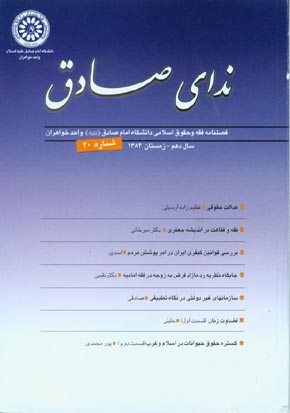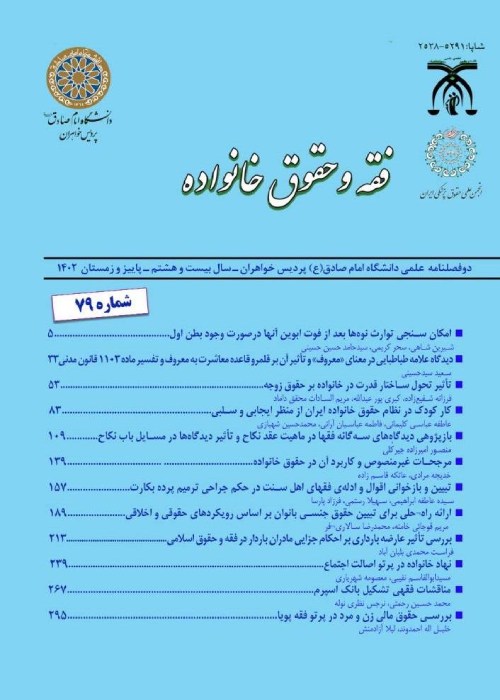فهرست مطالب

نشریه فقه و حقوق خانواده
پیاپی 40 (زمستان 1384)
- 170 صفحه، بهای روی جلد: 5,000ريال
- تاریخ انتشار: 1385/04/15
- تعداد عناوین: 9
-
صفحه 5
-
صفحه 12در تاریخ سراسر تحول و افتخار تشیع راستین نقاط ویژه و افقهای درخشانی به چشم می خورد که اصولا مطلع آن اعتقاد به امامت و استمداد از خورشید تابناک ولایت است. امامتی که با عصمت همراه گردیده و با محبت و ولایت بهمم آمیخته و سیاست و دیانت را یکجا پذیرا گشته است. و در نهایت با تمسک ولایی در ابعاد مختلف زندگی، عزت و صلابت را ره آورد این اندیشه ساخته است. از این جاست که مفاهیمی چون عدالت علوی فقاهت جعفری، نهضت مهدوی در مبانی نظری و رویکردهای علمی قوت ویژه ای را به این مکتب بخشیده است و رسالتی سنگین بر دوش حاملان این اندیشه ن هاده تا در حفظ و حراست، و احیا و ابقای آن، بدور از انحراف و التباس، و جمود و التقاط، پیرو امامان خویش باشند...
کلیدواژگان: فقه جعفری، قرآن محوری، مقلد، مقلد، استدلال، استناد، شیوه استنباط -
صفحه 48یکی از مبادی ورود دولتها در گذشته نحوه پوشش افراد جامعه بود. این دخالت گاه برخاسته از اقتدارگرایی دولت و گاه ناشی از تفکر دینی بوده است. در ایران حکومت پهلوی با دو مصوبه و یک فرمان دخالت در نحوه پوشش مردم را بنیان گذاشت. ...
کلیدواژگان: لباس، کیفر، حکومت ایران، حجاب، قانون -
صفحه 75فقهای امامیه درباره میراث زوجه از زوج معتقدند زوجه در فرضی که فرزند داشته باشد یک هشتم و در صورتی که فرزند نداشته باشد یک چهارم را به فرض ارث می برد ولی آنان در موردی که زوج وارث دیگری غیر از زوجه نداشته باشد اختلاف نظر دارند برخی بر این باورند که مازاد فرض زوجه از آن امام معصوم (ع) است و بعضی معتقدند که به فقرای محل زندگی زوج متوفی داده می شود و برخی آن را در عصر حضور از آن امام معصوم و در عصر غیبت از آن زوجه دانسته اند. ...
کلیدواژگان: میراث، زوج، زوجه، فرض، رد، ربع، ثمن، ماترک -
صفحه 89سازمان های غیر دولتی سازمان ها و نهادهایی هستند که در راستای اهداف صحیح به فعالیتهای علمی، اخلاقی، اقتصادی، اجتماعی در جوامع می پردازند. بر این اساس گسترش سازمان های غیر دولتی در کنار اقتصاد، بازار آزاد، خصوصی سازی، دموکراسی و اطلاع رسانی از جمله ابزارهای غیر دولتی هستند که جایگاهی مهم نزد مردم دارند. ...
کلیدواژگان: سازمان های غیر دولتی، حیات اقتصادی، مشارکت زنان، اندیشه اسلامی -
صفحه 112فقهای مشهور اسلام ذکورت را در قاضی شرط دانسته قضاوت زنان را مطلقا جایز نمی دانند و در تایید نظریه خویش به آیات قرآن کریم، روایات، اصل، اجماع وبعضی ادله دیگر استناد نموده اند. لیکن در این مساله اقوال مخالف از فقهای شیعه و اهل سنت نیز وجود دارد که بر ادله مخالفان قضاوت زنان خدشه وارد نموده قضاوت زنان را مطلقا و یا تحت شرایط خاص جایز و نافذ می دانند. ...
کلیدواژگان: حکم، قضا، اجتهاد، ذکورت، قیاس، عرف، مقتضیات زمان -
صفحه 136انسان به عنوان اشرف مخلوقات در تمام ادیان آسمانی از کرامت خاصی برخوردار است و حقوق و تکالیف زیادی دارد. سالهاست که جوامع مختلف به تدوین قوانینی از جنبه های مختلف حقوق انسانی پرداخته و هر روز مطلبی جدید به آن افزوده اند؛ حقوق کودکان، حقوق زنان، حقوق کارگران و...
کلیدواژگان: حقوق حیوانات، اسلام، قرآن، شبیه سازی، نفقه حیوانات، تغییرات ژنتیکی -
صفحه 153
-
چکیده مقالات به زبان انگلیسیصفحه 5
-
Page 12Although there have been many changes during the proud history of the true Shi’ism, but the basic principle of Shiism is the belief in our Imams and getting help from them. The Imams who are infallible and affectionate are practicing politics and religion together. In every aspect of our life we resort to our Imams, therefore the outcome would be honor and dignity. The concept such as Alawi justice, Jafari jurisprudence,and Mahdawi movement has bestowed a great strength to the foundation and practical perspective to this school of thought. It has also placed a great mission on the shoulders of the advocate of this school of thought,to protect and safeguard it against deviation. Therefore in analyzing the scientific and jurisprudentials movement of Jafar Ibne Mohammad Al-Sadiq (P.B.U.H.) and the present situation, they have realized the similarities which have the capability to respond to theological questions.Due to the analytical approach of these two eras it is necessary and important to continue further studies. In this article the author has attempted to study several issues on theology and knowledge of religious jurisprudence in Jafari school of thought and other issues as listed below.1-Clarifying the position of Jafar ibn-e Mohammad (P.B.U.H.) in different schools of thought and his role in strengthening Jafari jurisprudence.2-The position of the leader and follower in Jafari jurisprudence.3-Reasoning in Jafari jurisprudence and Quran being the source.
-
Page 48In the past governments interfered in the way people dressed. They were doing so, either to exercise authority or because of religious zeal.In Iran, the Pahlavi dynasty, by ratifying two laws and one order in 1307 laid the foundation of interfering with the way people dressed and also they considered having uniforms for government officials.In 1314, the rules passed for removing women’s covering,it was an attempt to make Iranians familiar with the outward look of the European civilization.After the victory of the Iranian Islamic revolution, people’s way of covering was taken into consideration. Therefore three laws were ratified:1- The clothing shops that sold inappropriate garments which were harmful to society were the ones who were supposed to be punished. 2- Two more laws were ratified in 1365stating that;A- If a citizen does not observe the above mentioned law, he or she also has to be punished.B- In accordance with an article of law 638 which was ratified in 1375: the article 102 which was related to imprisonment of the offender was modified to only paying a fine. If the government had approached this situation differently and taught the people gradually about Islamic culture they would have been more willing to accept the government’s interference. Therefore laws should be legislated in such a way that the people take them seriously. Thus these laws would be respected and followed by the people.
-
Page 75Whether women can inherit at all is not the controversy but, rather, the dispute centers around the “share”that is to be inherited.According to Islamic jurisprudence and Islamic laws of inheritance the wife shall inherit one eight of his estate if the deceased is survived by children. Otherwise she can only inherit one fourth.A question arises if a man has no other heirs except his wife, then who should inherit the remaining estate.Some Shiite schools believe that the remaining estate should be given to the infallibles or the poor in the locality of the deceased.In order to ensure women’s protection some other Shiite schools disagree and believe that in the absence of the infallibles the wife shall inherit the whole estate of the husband.So there are many conflicting opinions regarding the above mentioned issues,but obviously the source of those beliefs are narrations of the infallibles.In this article the writer addresses this issue to focus on those challenging laws of inheritance, that the wife shall be the sole heir and inherit the whole estate.
-
Page 89Non Governmental Organizations (NGO’s) are kinds of institutions which are engaged in scientific, ethical, economical and social activities in different countries.On this basis, the expansion of NGO’s in areas such as econimics, the free market and privatization in the era of democracy and communicative technology is vital to the people. On the one hand NGO’s can provide some of the needs of those societies, which governments cannot provide or do not have any interest in doing so. On the other hand they are liaison between the public and the government.In our country, like many other countries the NGO’s which are active under the auspices of the government have a long history.The existence of financial loans without interest and charity organizations are just some of the clear examples of these institutions.In this article the writer makes an effort to analyze the achievements of non governmental organizations and the Islamic point of views, which by using them safeguard the political and economic security of the country.
-
Page 112Renowned Muslim jurisprudents consider gender a condition for being a judge.They do not deem women’s judgment valid. In substantiating their view they have relied on scriptures from the Holy Quran, traditions, principles, concensus, deduction and legal proofs.However differences of opinions between Shiite and Sunni jurisprudents on this issue exist,which has effected the reasoning against the adjudication of women and consider their judgment valid under certain circumstances.According to the act ratified in 1361 only men are qualified for the conditions of being selected as judge.Based upon reputable views of Shiite jurisprudents judges are selected from men having certain qualifications.In the current judicial system the essence of judgment has been altered, therefore being a jurisprudent is no longer a condition for the appointment of men as judges.As a consequence gender is not a condition for being a judge.Taking this point into consideration no longer is gender a restriction for being a judge.Nowadays, in Islamic countries such as Jordan, Pakistan and Afghanistan women have occupied judges seats and the decrees issued by them are valid.While approving the reasoning of the wise, Imam Khomeini has stressed upon putting divine science and dynamic jurisprudence into practice.Taking into consideration the changes and requirements of the modern world, it is necessary that jurists and lawmakers review laws related to women especially the ones forbidding woman’s adjudication.
-
Page 136In all religions the human being is considered superior and a special being who has many rights and responsibilities. For many years social welfare organizations have studied the laws and developed human rights from various perspectives and have added new issues such as children’s rights, women’s rights and labor rights. Today communities have also turned their attention toward the issue that not only do human beings have different rights but also all creations that exist on earth including mountains, seas, animals and plants all have certain rights. Human beings have dominated all other creatures and have taken advantage of them. However, is there not a religious or ethical regulation to limit the extent to which humans take advantage of the other creatures. In this article animal rights and the extent of domination of animals by man are studied in Islam, Iranian laws and the world. Of course, what has been cited from the Holy Koran here is like a drop of water from the ocean. It is astonishing that Islam so carefully and precisely analyzed the issue thousands of years ago, but animal protection organizations have only recently taken such issues into consideration. Futhermore, in the last section of this article, research and experiments that have been done on animals and genetic modifications have been analyzed along with a study of the controversial issue concerning the Harvard mouse. Unfortunately, it appears that in Iranian laws, despite the Islamic background, little attention has been paid to the issue.


